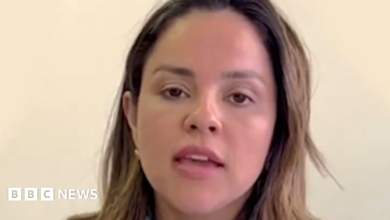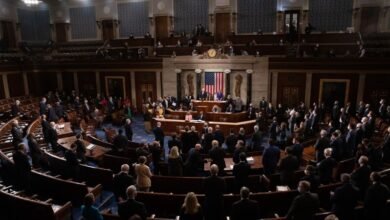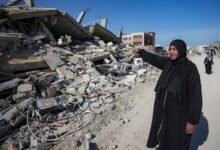Druse Leader Aims to Secure Place for Syrian Minorities

As Western diplomats explore establishing ties with the rebels who took power in Syria, a religious minority has been conducting its own diplomatic push to ensure protections for its members as the country rebuilds.
A representative of the group, the Druse, recently went to Washington to meet with lawmakers, members of the Biden and Trump administrations and diplomats to plead their case.
“We are very worried about the future,” Sheikh Muwafaq Tarif said in an interview in Washington, where he urged U.S. officials to prioritize protections for Syria’s 1.2 million Druse as part of their engagement with the country’s new government.
In December, after a long civil war, a coalition of Syrian rebels toppled President Bashar al-Assad and established an interim government. The rebellion put an end to a brutal regime, but for Western nations there remained a problem: The Islamist group that led the uprising once had ties to Al Qaeda and the Islamic State, and as a result was officially designated as a terrorist organization.
The rebel leaders have forsworn their old alliances and have pledged to build a Syria that is tolerant of other beliefs. And Western officials, eager for reconstruction to begin, have expressed their openness to working with the Islamist group now in power, Hayat Tahrir al-Sham.
But members of Syrian minority groups like the Druse, who practice an offshoot of Shiite Islam and can also be found in Lebanon, Israel and Jordan, remain skeptical. The spiritual leader of the Druse in Syria, Sheikh Hikmat al-Hajari, expressed wariness in a recent interview with a German broadcaster over the promises of tolerance offered by Syria’s de facto leader, Ahmad al-Shara.
Sheikh Tarif, his counterpart in Israel, suggested that Mr. al-Shara was not moving quickly enough.
“He is speaking nicely,” Sheikh Tarif said. “What I hear is that the West is excited and they like what he says. But there is a lot of fear among minorities. We want the statements to be borne out by actions.”
Mr. al-Shara has sought to distance himself from his group’s jihadist roots, promising to draft a new constitution, expressing relatively moderate political positions and seeking to reassure Syria’s minorities. In the Sweida district in the south, for example, a Druse woman was recently appointed governor.
But some observers have suggested that Mr. al-Shara may be engaged in mere posturing to open the flow of foreign aid. Already, some moves his new government has made — like sweeping changes to textbooks — have raised concerns within Syria about his professed commitment to religious diversity.
Sheikh Tarif said that in his meetings with Western officials, he was pressing for much-needed economic assistance for Syria, and for sanctions imposed on the country to be lifted — but only conditioned on proof that the new government is keeping its commitments. He said he has also been trying to position the Druse community in Syria and throughout the Middle East as key partners for Western nations aiming to influence outcomes in the country and region.
For centuries, the Druse have survived across the Middle East in part by integrating politically in the countries where they live, even while keeping their religious practices distinct. In Syria, they have played a significant historical role, leading a revolt against French rule in 1925 that came to be seen as the nation’s first nationalist uprising.
“The Druse paid a high price for Syria’s independence,” Sheikh Tarif said.
When the uprising against the Assad regime began in 2011, some Druse aligned with the rebel groups, though the community’s support was mixed, with concern that jihadist groups fighting the regime would prove hostile to their beliefs. Druse fighters did take part in the rebel offensive that deposed Mr. al-Assad.
In Israel, the Druse community of about 150,000 people that Mr. Tarif leads has in recent years protested the far-right government’s adoption of a law that marginalizes minorities. “There is a lot to improve,” he said. But Mr. Tarif dismissed criticism of the Israeli military’s recent moves to seize territory in Syria near its border, saying Israel was acting to ensure it own security.
He noted that Druse commanders and soldiers had lost their lives fighting as members of the Israeli military in the conflicts set off by the Hamas-led attack on Israel on Oct. 7, 2023, and recalled the deaths last summer of 12 young Druse in the Israeli-controlled Golan Heights who were killed by a Hezbollah rocket from Lebanon.
Given their presence in several nations, Sheikh Tarif said, the Druse consider themselves a potential bridge. “We can show how to live in peace,” he said.
https://static01.nyt.com/images/2025/01/12/multimedia/OakArticle-DRUSE-SYRIA-mclv/OakArticle-DRUSE-SYRIA-mclv-facebookJumbo.jpg







